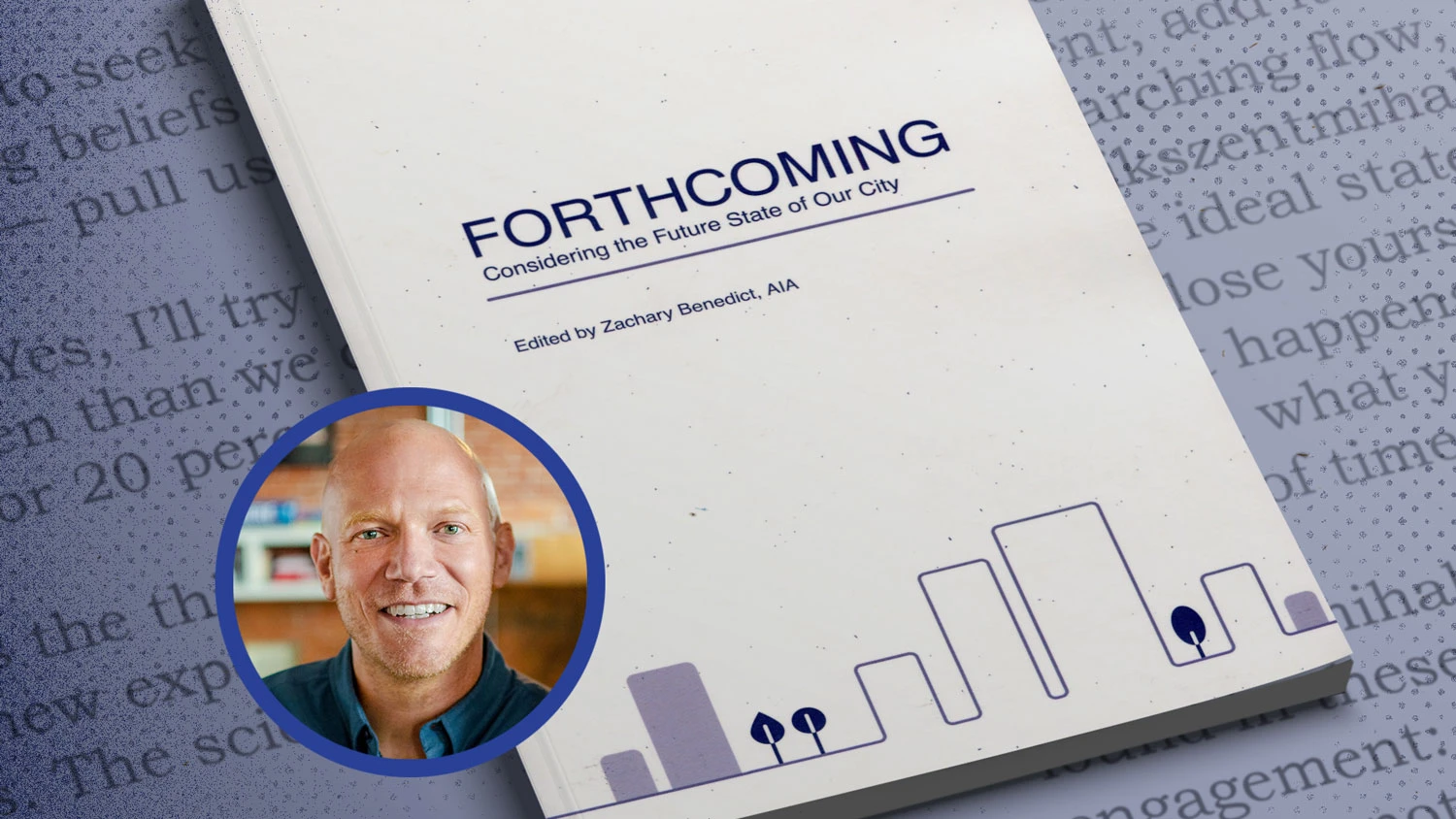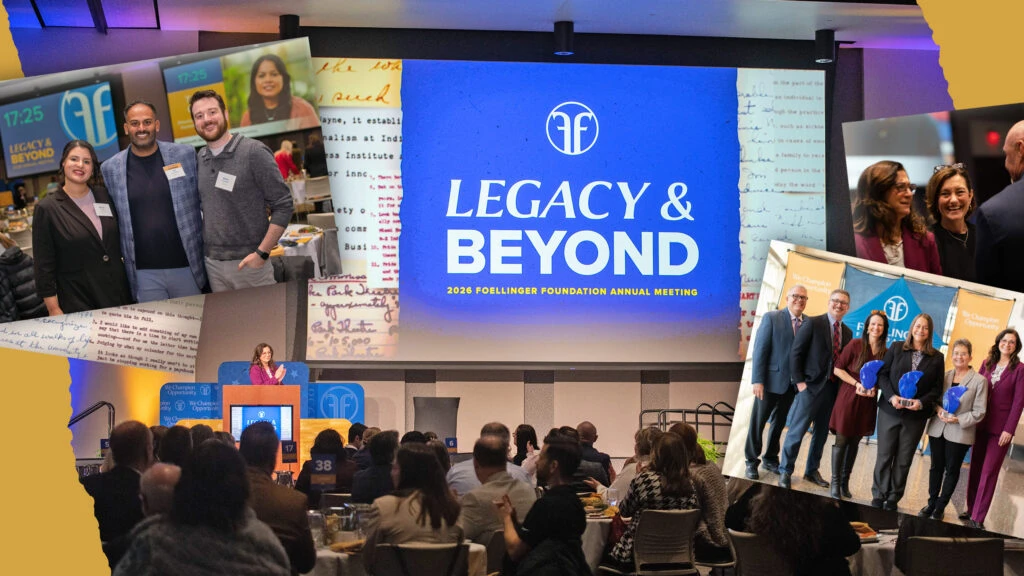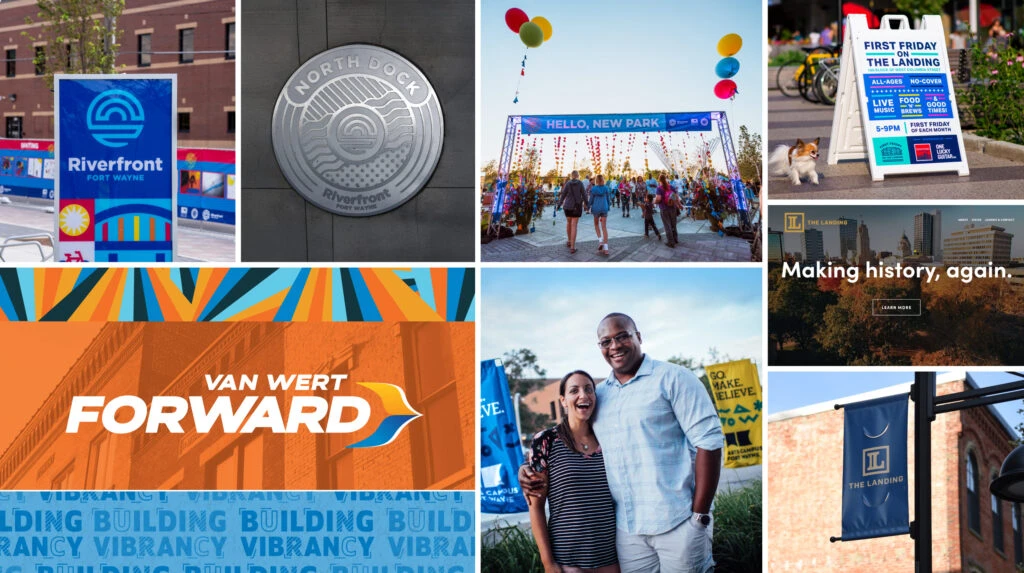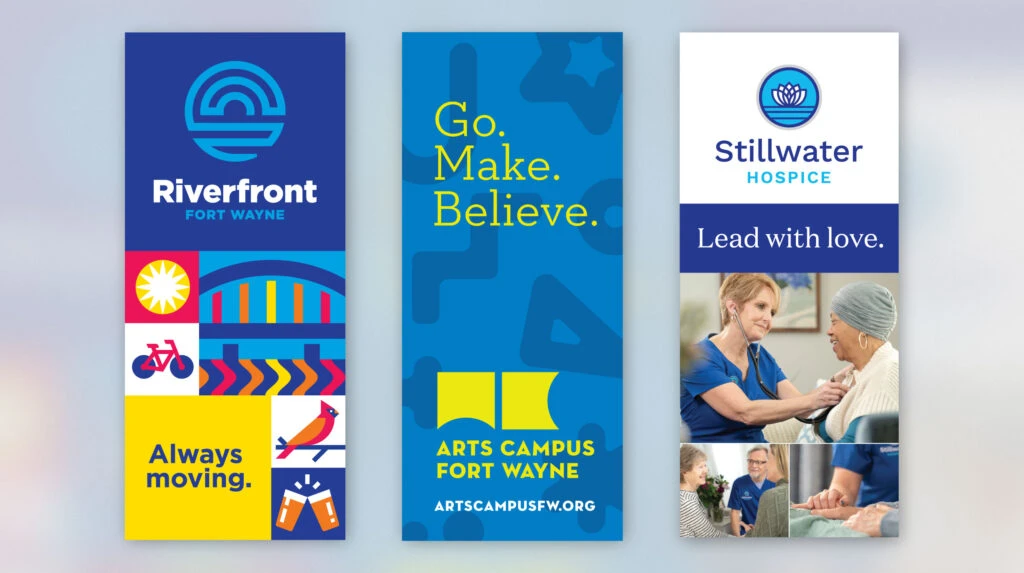In October 2020, OLG principal Matt Kelley was asked to contribute to FORTHCOMING: Considering the Future State of Our City—a book project that invited 20 Fort Wayne voices to write 2,000-word essays outlining 20 ideas that could shape our community’s story over the next 20 years.
Each essay has a single-word title. Matt’s is called SEEK and asks what life would be like, post-pandemic, if every citizen in our community was 10% more curious, and 10% less set in our ways? MK offers some science, some storytelling, and a few recommendations on how to make it happen.
“SEEK” is OLG’s 2022 rallying cry.
Read the essay below, and consider picking up a beautifully designed hard-copy at MKM’s downtown office—with all proceeds supporting United Way of Allen County.
FORTHCOMING was developed and published by Zach Benedict of MKM Architecture + Design.
Seek
by Matt Kelley
“I love the unknown,” Eef Barzelay, in front of the Fort Wayne Philharmonic orchestra, sang to eleven-hundred people at the Auer Performance Hall on (I)PFW’s campus on the near-northeast side of Fort Wayne, IN. It was July 8, 2011.
Mr. Barzelay is the songwriter and leader of the band Clem Snide, from Nashville, Tennessee. He continued singing,
“They asked him, ‘Hey, where is this bus going?’
He said, ‘Well, I’m really not sure.’
‘Then how will you know where to get off?’
And he said, ‘The place with the most allure.
Because I love the unknown,
I love the unknown,’
He said he loves the unknown…’”
The concert was called Fortissimo: A Symphonic Collision of the Precise and the Unbound, and featured Clem Snide along with Fort Wayne-based bands Metavari and The Orange Opera performing their original compositions with the orchestra. To upend expectations from the downbeat, the Philharmonic opened the evening with a dissonant avant-garde piece.
The audience ranged in age from high school kids to septuagenarians, some in hard-worn band t-shirts, others in neckties.
Stephen Thompson, producer for NPR Music, attended the concert. He asked me backstage, “What’s the conceit of this city, this event? I might expect to experience something like this in San Francisco or Toronto, Seattle or New York, but here? What’s happening in Fort Wayne — and what are you all seeking to become?”
Writing in the autumn of 2020, I’m very aware that our community — like each and every community around the globe — has endured a pandemic-sized disruption in its trajectory.
Fort Wayne had been a city on the rise for the entirety of this century; plans well made in the 1990s came to life over the last two decades, and our flywheel took hold. By the second half of the 2010s, it often felt like we were stacking trophies on trophies, decisively winning with each new development and initiative.
Today, our goals are a bit more fundamental. As the late North Carolina State coach Jim Valvano said, we must simply survive — and advance.
Hold your finger to the wind, and you’ll feel a collective desire for things to “get back to normal” — and for our community to get back on its winning streak.
And yet, as we imagine our post-pandemic future — six or twelve months, three, five, even twenty years from now — we should examine how we can make those days and years ahead better, more vital, more full with understanding and a heightened emotional wellbeing for each and every one of our residents.
Things were, overall, pretty good. But “good” exists as a word to describe things that are not bad and not great.
What if things were great?
As a community, we are often set in our ways and safe in our silos.
The pandemic has given us the opportunity to reset and see things anew. To not retreat to “normal life” again, but to reimagine it and reinvent it.
My question is: what if we come out of this even 10 percent more curious in the way we invest our most important resources — our time and our hearts?
That’s just five weekends a year where we do something we’ve rarely – or never – done before: experiencing an event, visiting a community, or immersing ourselves in a happening we’ve never fully understood or felt comfortable at.
What if every single citizen did that?
Pre-pandemic, some friends and I would travel to participate in an event called a Tough Mudder. Tough Mudders are basically ten or twelve-mile trail runs, with a couple dozen physical obstacles interspersed. There’s a lot of mud, along with trenches, walls, ramps and ravines to traverse. It’s decently tough — and marvelously fun.
At the start of each event, there’s a rally led by Mudder Nation hype man, Sean Corvelle, whose invigorating speech culminates with him asking, “When is the last time you did something for the first time?” The crowd erupts.
It’s a question we should ask ourselves in Fort Wayne.
Sure, I tell myself I have a bias for adventure. But when I dig deep, I see how I’ve swaddled myself in the things—the foods, the places, the sounds, the experiences—I already know I do or will like.
Will a “return to normal” mean a “return to the routine?” Despite living in an incredibly diverse community and region — eleven counties, nearly 800,000 people, dozens of languages, and thousands of unique experiences, we so often stick to what we know. (And then we wonder why we feel stuck.)
To illustrate this point: yesterday, I saw a video of my friend, hip-hop artist J. Tubbs, and his friends, at the roller rink on the south side of Fort Wayne, doing synchronized skating that just blew my mind. I told him how impressed I was; he invited me to join them next time.
Will I? Probably not.
I fear I won’t be good at it; I fear for the embarrassment I’ll feel over lacking the balance, the effortlessness, the groove that Jamaris and his friends have. Heck, I fear that Tubbs’ friends might not like me.
These limiting beliefs, as they’re known, keep us in our comfort zones. Maybe I’ll just go mountain biking at Franke Park, alone, instead. After all, I already know I like that.
The comfort zone is a place where we minimize stress and risk. But we also minimize growth.
Curiosity pushes us to seek out new experiences. Limiting beliefs — which are deep in our wiring — pull us back.
What if we said, “Yes, I’ll try it” — just ten percent more often than we do now? (How about 15, or 20 percent?)
Because here’s the thing. Getting curious, seeking new experiences, it’s actually good for us. The science demonstrates as much.
Writing in Scientific American, Luke Smillie says that in becoming a person who regularly takes calculated risks, challenges yourself, and tries new things, you’ll cultivate openness to experience, one of what’s known in psychology as the “Big Five” personality traits. Openness to experience — which is characterized by qualities like intellectual curiosity, imagination, and a cognitive exploration that drives one to see the possibilities in every situation — has been shown to be the best predictor of creative achievement.
What’s more, as reported by the Greater Good Science Center at UC Berkeley, curious people are happier. Research has shown curiosity to be linked to greater levels of positive emotions, psychological well-being and satisfaction with life, and lesser levels of anxiety.
Curiosity expands our empathy. When we are curious about others and actually seek to talk to people outside of our usual social circle, we become better able to understand those with lives, experiences, and worldviews different than our own.
Limiting beliefs and fears take the commune — the sharing of thoughts, ideas and feelings — out of community.
Fort Wayne, a city on the rise, often sticks to itself.
Imagine two decades of curiosity and the benefits that would bring to our city, to the businesses and organizations where we work, study and worship, to the personal and family lives of those we love, and to ourselves.
Pretty cool. But how do we get there?
Here are some ideas.
Write down your daily and weekly routines. Study these lists; are there things you do that just pass the time, or things that maybe you wish you did a little less of?
Similarly, write down your limiting beliefs. Examine the control they have, the impact they make on your life — the way they keep you in your comfort zone. (If I could rewrite my life, I would attempt to overcome my limiting beliefs and fears decades before I finally tried to.)
Make a “Seek List” of things you’ve never, or rarely, done.
Feel free to start small: dining at a restaurant you’ve never been to, volunteering at a community event you think is targeted to someone other than you, attending a Sunday service on the other side of town.
Cross something off your list every couple weeks — but, also, keep adding to it.
You’ll feel a bit of anxiety or fear trying something new; you’ll also find your mind likes to exaggerate the potential danger. The more you do, the less crippling those feelings become. Instead, they’re a minor nuisance between you and some new experience.
As your list grows, write the ideas on small pieces of paper and put them in a jar.
On the outside of the jar, write down this line from Dr. Seuss: “If you never did, you should. These things are fun, and fun is good.”
Shake the jar and pull out an idea on Monday morning; make a plan to do it by the following week.
Find a partner to do all of this with, maybe a handful. Encourage and challenge each other: “This weekend, your jar or mine?”
In 2019, I was invited to speak at a CreativeMornings Fort Wayne event on the topic of “flow.” (If you’ve never been to a CMFW event, add it to your Seek Jar.) As I was researching flow, I came across Mihaly Csikszentmihaly, who says that flow is “the ideal state of learning — when you lose yourself entirely in an activity.” It happens when you’re so engaged in what you’re doing that you lose track of time.
Csikszentmihaly says that happiness is found in these moments of profound engagement: “The best moments in our lives are not the passive, receptive, relaxing times; the best moments usually occur if a person’s body or mind is stretched to its limits in a voluntary effort to accomplish something difficult and worthwhile.”
Well, isn’t that the truth?
Spoiler alert: you won’t love, or even like, everything you try. That’s okay.
As we learn more about our likes and dislikes, we come to know ourselves better — both who we are today and how we hope to grow tomorrow. It’s a strange — and liberating — feeling to realize you don’t know yourself as well as you thought you did.
Your life can change when curiosity overcomes fear and you discover a love for something you had no idea would ever capture your imagination.
Imagine Fort Wayne putting its best foot forward, walking into a new experience.
Isn’t that the kind of place you’d love to call home? The kind of place where you’d love to learn and grow?
For some communities, the more success they have, the less likely they are to take risks. That success causes them to become locked on what has worked so far and close their minds.
As you consider Fort Wayne in twenty years, are our minds closed — or open?
The owl of Minerva flies only at dusk, as the saying goes. We gain wisdom through hindsight — through our experiences.
Let’s make sure we have a lot of ’em.
I’m calling J. Tubbs.
Over the last decade, Eef Barzelay has performed in Fort Wayne at least once a year. By some stretch, ours is the smallest market he plays.
He told me, “There’s a sense of appreciation in Fort Wayne. In other cities, it can feel like you’re taken for granted, but here, people pay close attention to the nuance of everything I’m seeking to communicate. As a creative person, that encouragement, that exchange, is irreplaceable.”
At Fortissimo, Barzelay sang the final verse and chorus of the evening’s final song:
“The doctor asked him what he was afraid of;
just what was he running from?
And he said, ‘It’s not the fear of success, nor of closeness,
but of going through life feeling numb.
That’s why I love the unknown,
I love the unknown,’
He said he loves the unknown…”
Might we all seek to love the same.
Recommended Resources:
Clem Snide, “I Love the Unknown” from the album ‘Your Favorite Music’
8 Ways to Create Flow According to Mihaly Csikszentmihalyi
Openness to Experience: The Gates of the Mind
Joe Henry on the On Being with Krista Tippett podcast
Also, every record he’s ever made or produced.





